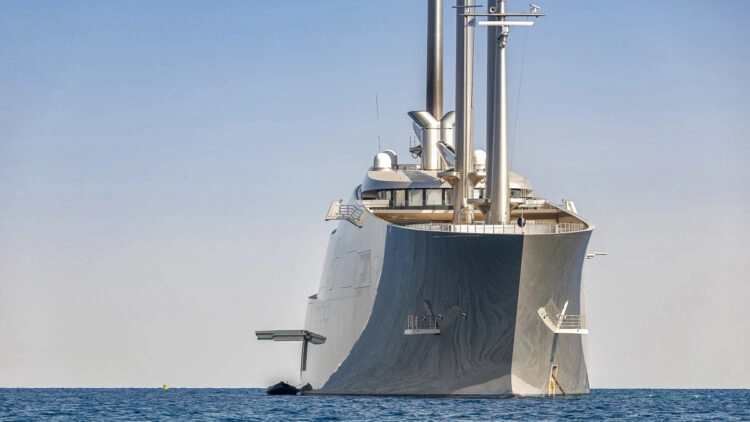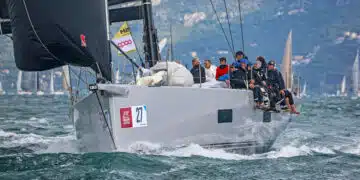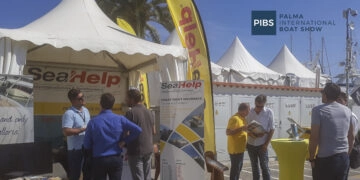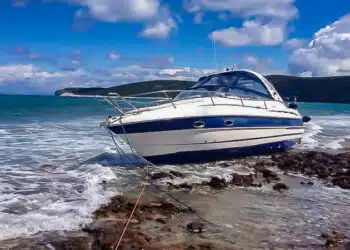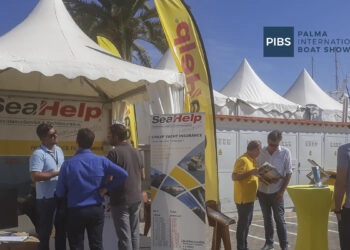The authorities of several countries are hunting for the assets of Russian oligarchs because of Russia’s war against Ukraine, among which several superyachts have been seized so far. The 143-meter luxury sailing yacht A owned by Andrey Melnichenko was also chained up. But how does it actually look with the legal basis in the expropriation of yachts of Russian oligarchs?
Because of Russia’s war against Ukraine, several superyachts were temporarily seized in recent days as part of the EU sanctions against Russian oligarchs. For example, the FAZ reported on March 12 that the Guardia die Finanza has struck in its hunt for oligarch assets; it says Italian financial police showed up at the port of Trieste and seized Andrey Melnichenko’s luxury yacht.
The article, published at faz.net, goes on to say that “the 143-meter-long vessel named “A” has three masts, the tallest of which, at 100 meters above the waterline, is taller than Big Ben or the American Statue of Liberty. According to the Italian government, the yacht has a value of 530 million euros. It was confiscated as part of sanctions against Russian oligarchs in connection with the war in Ukraine.
Seized superyachts belonging to Russian owners have been reported in Italy and several Spanish ports
A week ago, Italy had already announced that it had seized assets worth 143 million euros belonging to Russian oligarchs. Fifty-year-old Melnichenko is considered a group leader close to Vladimir Putin. On the latest list of the magazine “Forbes” he is ranked 105th among the richest billionaires with an estimated fortune of 11.6 billion dollars.”
Two superyachts were also chained in Spain: As the Mallorca newspaper reported on March 15, the yachts “Tango” and “Lady Anastasia” had been detained in Mallorca. Further it says in the message published under mallorcazeitung.es: “The Spanish government has on Tuesday (15.3.) in connection with the EU sanctions against Russian oligarchs for the first time yachts on Mallorca temporarily seized.
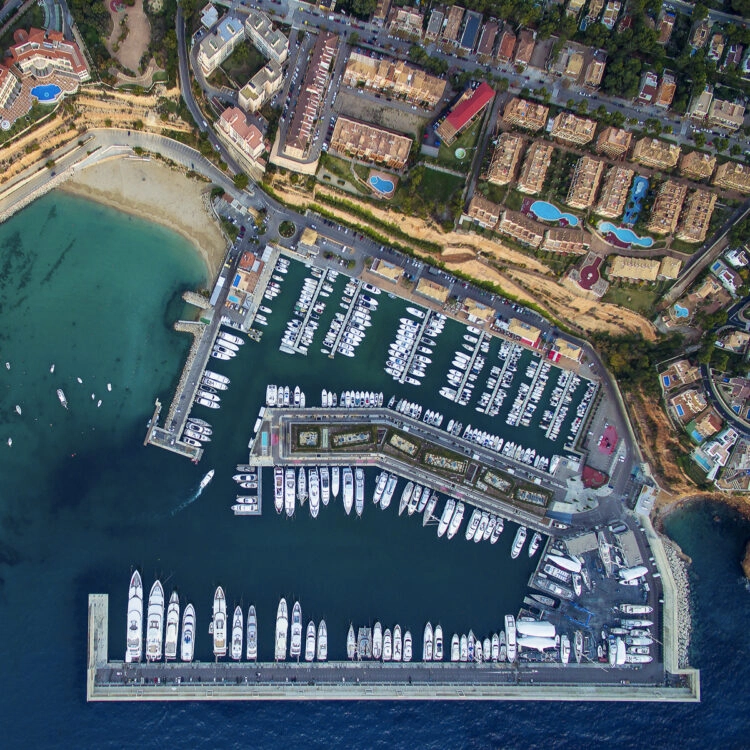
The Russian owners of the luxury yachts are said to be confidants of Vladimir Putin
One is the “Lady Anastasia.” The 47-meter luxury yacht had hit the headlines at the end of February because a Ukrainian had tried to sink it in the port of Port Adriano. The ship is currently guarded by the Guardia Civil until the formalities of the arrest are completed, confirmed the port manager Isabel Teruel to the MZ sister newspaper “Diario de Mallorca”.
According to information from the “Diario de Mallorca”, the owner of the “Lady Anastasia” is Alexander Mikheev, CEO of Rosoboronexport, Russia’s largest state-owned arms production and distribution company. The 60-year-old is said to be a confidant of Russian President Vladimir Putin.
According to information from the MZ sister newspaper “Diario de Mallorca”, the “Tango” is also said to have been detained in the port of Palma de Mallorca. Officials of the customs investigation are now examining the ship. As long as the investigations continue, it cannot leave the port. The luxury yacht owned by Russian oligarch Viktor Wekselberg, estimated at 150 million euros, is currently undergoing maintenance at the shipyard.
According to Forbes magazine, Viktor Wekselberg has a fortune of more than nine billion euros
Wekselberg is considered one of the richest men in Russia. According to Forbes magazine, he has a fortune of 9.3 billion euros and is ranked 262nd on the list of the world’s richest people. He owns the world’s largest aluminum company and invests in the energy and telecommunications sectors. On Sunday (Mar. 13), the U.S. had “blacklisted” Tango as part of a package of sanctions.
Only on Monday it had become known that the authorities had also seized the luxury yacht “Valerie” in Barcelona. This is said to belong to the head of the Russian state arms company Rostec, Sergei Chemezov, as reported by dpa.”
But what about the legal basis for the expropriation of yachts belonging to Russian oligarchs?
But what about the legal basis for the expropriation of Russian oligarchs’ yachts? Dogmatically, the property guarantee is a central fundamental right in the spectrum of the constitutions of the EU, but with very different manifestations in particular of the expropriation possibilities in connection with compensation regulations at the national level, writes the lawyer Prof. Christoph Schließmann, who specializes in international yacht law, on superyachtforum.eu.
Schließmann continues, “…dogmatically, the property guarantee is a central fundamental right in the spectrum of EU constitutions, but with very different manifestations in particular of expropriation possibilities in connection with compensation schemes at the national level.”
The overriding legal basis is the European Convention on Human Rights with its additional protocol as well as the EU Charter of Fundamental Rights
He said the European Convention on Human Rights with its additional protocol and the EU Charter of Fundamental Rights are the overriding legal basis. “The property guarantee is an original core of the European Convention on Human Rights; the Charter of Fundamental Rights of the European Union is the common fundamental right of all national constitutions.”
But even there, he said, there are exceptions to the property guarantee; Article 17 of the Charter of Fundamental Rights sets out three conditions for the deprivation of property, Prof. Schließmann said: “(a) it must be provided for by law, (b) it must be in the public interest, and (c) it must be accompanied by adequate compensation in good time.”
The question is whether property seizure without compensation can be permissible
While the first two requirements are clear, the compensation requirement raises questions, he said. Above all, it is questionable whether a property seizure can be permissible without compensation, because only then would the intervention in the assets of oligarchs with Kremlin ties make sense, the yacht law professional said.
According to the law of the European Convention on Human Rights ECHR, formal expropriation, that is, the formal transfer of property from the owner to the public authorities as a deprivation of property is possible, and regardless of whether this takes the form of a law, an administrative act, a court decision or a private law contract, he said.
EGMR: expropriation without compensation permissible in “exceptional circumstances” and also proportionate
However, the case law of the European Court of Human Rights ECtHR makes it clear that the amount of the compensation obligation must be assessed within the framework of the proportionality test. In doing so, the ECtHR considers expropriation without compensation to be perfectly permissible and proportionate under exceptional circumstances.
In doing so, it invoked a broad discretionary power of the member states. Schließmann: “Such exceptional circumstances are possibly given here”.


